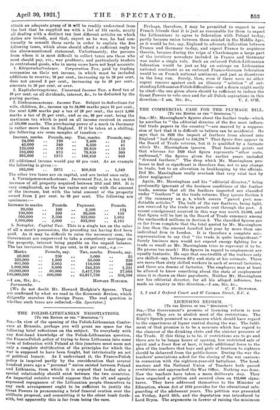THE COMMERCIAL CASE FOR THE PLUMAGE BILL. (To THE EDITOR
or THE " SPECTATOR.") Sea.,-Mr. Massingham's figures about the feather trade-which he ascribes to " the editorial director of the five most influen- tial trade papers in the country "-are marred by a suppres- sion of fact that it is difficult to believe can be accidental. He says that in 1920 the import of feathers from abroad into England " had dropped to £48,234." That figure does appear in the Board of Trade returns, but it is qualified by a footnote which Mr. Massingham ignores. That footnote points out that whereas for 1920 that figure represents "other sorts. undressed," the figures given• for earlier years included " dressed feathers." The drop which Mr. Massingham pro- fesses to find so significant is therefore due, not to any change in trade, but to an alteration in bookkeeping by the officials. Did Mr. Massingham really overlook that very vital fact by sheer negligence?
Again, Mr. Massingham and his "editorial director," being profoundly ignorant of the business conditions of the feather trade, assume that all the feathers imported are classified under "feathers" in the trade returns. They ignore Section 5 of the summary on p. 4, which covers "parcel poet. non- dutiable articles." The bulk of the raw feathers, being light, are received by the trade in parcels sent through the post. A recent consignment received in this way was worth £3,000, and that figure will be lost in the Board of Trade summary among the unclassified millions in Section 5. The classified figures are PO far from complete that the total quoted by Mr. Massingham is less than the amount handled last year by more than one individual firm in London. It is therefore a complete mis- representation to say that " the trade is quite insignificant." Surely business men would not expend energy fighting for a trade so small as Mr. Massingham tries to represent it to be. He proves too much! His figures in regard to employment are equally fantastic. He says that one-twelfth of the workers only are skilled-say, between fifty and sixty at his estimate. There are more than sixty skilled workers in each of several factories, and there are dozens of factories. The employers may at least be allowed to know something about the state of employment since it is shown on their pay-sheets. Neither Mr. Massingham nor his editorial director, for all his alleged influence, has made an inquiry in this direction.-I am, Sir, &c.,
C. F. DOWNHAAf.
1, 2 and.3 Oxford Court and 97 Cannon Street, E.C. 4.


































 Previous page
Previous page